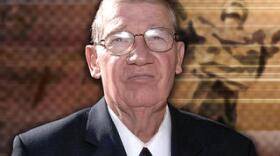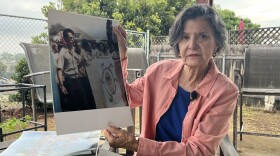Accused gunman Maj. Nidal Hasan sent 18 e-mails to a radical imam in Yemen before the Fort Hood shootings, but law enforcement officials in Washington who were looking into his behavior saw only two of them.
Confusion between two FBI field offices kept law enforcement officials from reviewing all pertinent information about Hasan, investigators told NPR.
Officials familiar with the investigation say the FBI's Washington field office was given the alleged shooter's file in February. That file included Hasan's personnel records, as well as two intercepted e-mails Hasan had written to imam Anwar al-Awlaki.
Awlaki has been on the U.S. intelligence community's radar screen for some time. He spreads his views through a blog, lectures on YouTube and has thousands of fans on Facebook. Hasan attended a mosque in Northern Virginia where Awlaki once served.
It's known already that Hasan had e-mailed the imam — but original reports suggested that those e-mails didn't raise any suspicion. Hasan was working at Walter Reed Army Medical Center as a psychiatrist, and the communications were seen as consistent with research he was doing at the time.
However, it now seems that the FBI's conclusion — that the e-mails were benign — might have been based on an incomplete review.
Here's what apparently happened:
The FBI's Washington field office was asked to follow up any leads on Hasan for the San Diego FBI office, which was in charge of his case. Three months after he originally received Hasan's file, the agent in Washington did follow up. But he didn't ask for an updated file — and the San Diego field office didn't offer additional information they had picked up on Hasan after forwarding the original file.
Those e-mails were never forwarded from the FBI's San Diego office because they were awaiting the Washington office's assessment of Hasan. The additional e-mails, in the eyes of agents in San Diego, appeared to be more of the same — more questions from Hasan about Muslim soldiers in the U.S. military.
Had there not been this breakdown in communication, the FBI agent in Washington might have been able to review a broader array of information, including the 16 more recent e-mails Hasan had written to Awlaki, to make his assessment on whether the major was dangerous or not.
E-Mail Focused On Earlier Attack
One e-mail in particular is getting attention from investigators now.
In that e-mail — which the Washington FBI office didn't see — Hasan mentioned the case of Sgt. Hasan Akbar, the Muslim soldier who threw grenades at fellow troops in Kuwait at the beginning of the Iraq war. The attack killed two soldiers and wounded 14 others.
In the e-mail to the imam, Hasan asked whether Akbar would have been considered a shaheed — or hero — for his actions. Given what happened later at Fort Hood, investigators say this e-mail now appears suggestive. But at the time it was not conclusive. Investigators in San Diego weren't alarmed by the query because it appeared to be consistent with research Hasan was doing at Walter Reed. The Akbar case was thought to be at the center of his research.
Should it have set off alarm bells?
Juan Zarate, a deputy national security adviser in the Bush administration, said hindsight is always 20/20.
"It is very difficult in the moment, I think, for analysts and agents and his cohorts and co-workers to piece this together and see they had a ticking time bomb on their hands," Zarate said.
A New View Of How Shootings Unfolded
Investigators also tell NPR that they uncovered some evidence that offers a somewhat different picture of what happened at Fort Hood during the shooting.
Witnesses have told investigators that Hasan had the opportunity to kill the female police officer who had tried to stop him. Apparently, he aimed for her head and then changed his mind, shooting her in the leg instead. Investigators say that this was part of what they see as Hasan's deliberate effort not to shoot civilians. His focus appeared to be on soldiers in uniform.
There had also been a sense that Hasan might have been targeting colleagues in the mental health unit at Fort Hood. That, too, seems to have been disproved by discussions with witnesses. Investigators say that he had the opportunity to shoot people he knew and purposely trained his weapon elsewhere.
Copyright 2022 NPR. To see more, visit https://www.npr.org. 9(MDAzMjM2NDYzMDEyMzc1Njk5NjAxNzY3OQ001))






